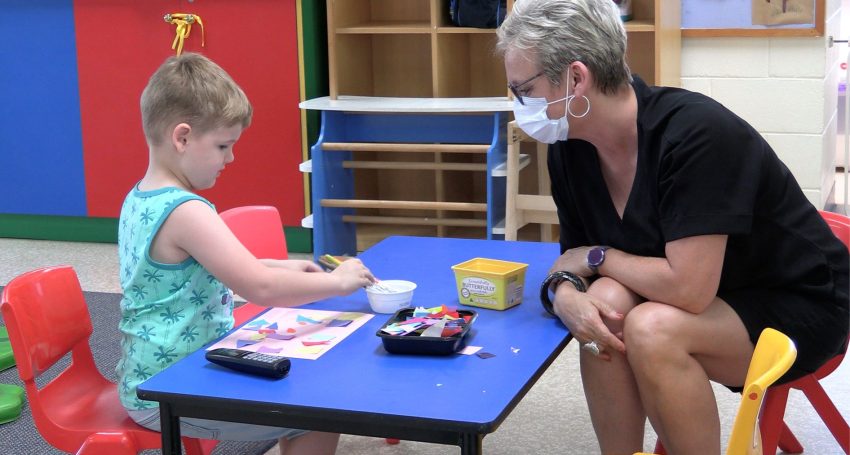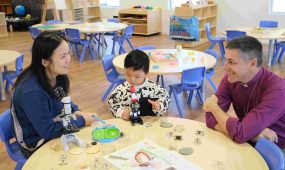How you can help your anxious child return to school in Queensland this week: Anglicare
News
This week marks the beginning of the school term for many students after the holidays were extended by two weeks due to the Omicron variant. With thousands of students excited about catching up with their friends at school, there are many families who are anxious about mask wearing, vaccination rates and the sharing of stationery. Anglicare’s Family Wellbeing Coordinator Justine Penny offers some practical tips

This week marks the beginning of the school term for many students, who will be saying goodbye to late nights and welcoming the arrival of the school bell, after the holidays were extended by two weeks due to the Omicron variant.
With thousands of students excited about catching up with their friends at school, there are many families who are anxious about mask wearing, vaccination rates and the sharing of stationery.
Early last week the Queensland Government announced a back-to-school plan which covers the first four weeks of the school year, from 7 February to 4 March.
All high schoolers will be required to wear masks and those children in years 3 to year 6 will also be highly encouraged to wear a mask.
Teachers can remove their masks to teach, and children won’t need to wear one when they are seated.
“Children are not only concerned around catching COVID-19 or ‘germs’ as the younger children call it, but they are concerned about missing the social aspect of school, particularly seeing their friends,” said Justine Penny, Anglicare Southern Queensland’s Family Wellbeing Coordinator, who works for the organisation’s Mental Health and Family Wellbeing service.
“The people who were affected with the most amount of change at the start of 2020 were the children, as they didn’t go to school. They learnt from home after school activities were cancelled, and sports, music, dance were all stopped. Bigger events such as sports days, school productions, awards ceremonies and school camps were also cancelled.”
Ms Penny has worked with families who are concerned about COVID-19 and the sharing of desks, stationery and equipment in primary schools once school resumes.
Advertisement
“In the younger grades stationery, such as pencils, erasers, scissors, glue sticks and pencil crayons, are shared in the classroom,” she said.
“We discussed with parents how their children could take a pencil case with items named and only they would be allowed to use it to minimise the risk.
“Parents can take proactive steps before school starts by educating your children, without scaring them, with age-appropriate information around masks, hand washing and hand sanitising and also around not sharing things such as hats, food and drink bottles.”
Ms Penny said it was perfectly normal that some students may be anxious about the start of the school year, but there are several things you can do to help ease your children back into the new routine.
“Anxiety can present differently for all people,” she said.
“A parent knows their child the best. It could be that they say they feel sick in the tummy, have a headache or parents could notice behavioral changes, becoming moody, angry, or alternatively retreating into themselves and not wanting to communicate.
Advertisement
“A key strategy is to keep an open dialogue – encourage your child to ask questions. As a parent you can bring calmness and soothe a child’s anxious response.
“Michael Hawton, who developed a program called ‘No Scaredy Cats’ to help parents reduce anxiety and build resilience in children, says: ‘Name it to tame it.’
“Parents can enable resilience and lessen anxiety by naming the feeling. For example: ‘I can see you are feeling anxious, upset, stressed, worried, angry, frustrated.’ If you name what you see this enables the child to feel listened to and heard.”
A great children’s book that covers the basics of anxiety is Hey Warrior by Karen Young.
Ms Penny said it was equally important that parents take time out of their day to relax and unwind.
“As parents we forget about ourselves as we are busy looking after everyone else,” she said.
“Find out what works for you and fits with your lifestyle. What fills your cup? It could be practising mindfulness, breathing techniques, reading, exercise, watching your favourite TV show, getting outside, having a bubble bath/shower, or going to bed early.
“Spending some quality time with your family might be your idea of self-care, creating laughter and positive energy, going for a family walk, going to the park, or playing board games together.”
The Anglicare Mental Health and Family Wellbeing service offers a range of programs to help children and parents. All the practitioners are qualified and can work one-on-one with children and families offering supportive advice on parenting and the daily issues facing all parents.
They also help develop parenting skills, such as ways in which to enhance resilience within the family, providing support with social and emotional wellbeing and self-care, sharing ideas on how to support your child’s development and growth through key transition periods.





